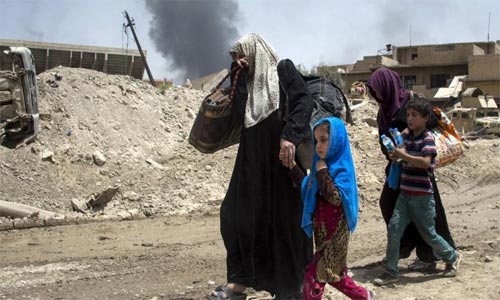Some high-level members of Security Council have stalled the UN resolution calling for a halt to the fighting for control of the port city of Hodeidah, the main entry point of supplies, and for guarantees from the warring sides for safe delivery of food and medicine to Yemen, where 85,000 young children died out of hunger and the lives of 14 million people are at risk of a famine.
Yemenis suffer severely as a result of war initiated by Saudi-led coalition forces, which are reportedly involved in gross violation of human rights and humanitarian law.
Airstrikes targeted Yemenis at weddings, funerals, and on school buses, killed thousands of civilians, including women and children. The Saudi-led airstrike on a school bus in August, which killed and wounded tens of children, was one of the worst-case event that outraged the public conscience. Meanwhile, ICRC said the coalition forces killed 55 civilians and wounded 170 in attacks on hospitals and fish market on August 2.
The coalition that has been fighting Yemen’s rebels since 2015 acknowledged responsibility for the attack on school bus, but claimed the bus was carrying “Houthi combatants” and called it a “legitimate military action”.
UN describes the war in Yemen as the world’s worst humanitarian crisis in the wake of large-scale violation of humanitarian law.
The devastating war in Yemen has attracted more global attention recently as outrage over the killing of a Saudi dissident Jamal Khashoggi in Saudi Arabia’s consulate in Istanbul turned a spotlight on Saudi actions. With the acknowledgment of the kingdom that its officials were behind the gruesome murder, the kingdom of Crown Prince Mohammed bin Salman (MBS) came under harsh global criticism. That is, the killing of Khashoggi battered MBS’s image globally.
An Argentine Judge seeks to complain by Human Rights Watch against MBS for his involvement in the war in Yemen and Khashoggi’s murder.
According to international humanitarian law, warring sides have to respect and protect the rights of noncombatants and attacks should be directed solely against legitimate military targets. Similarly, attacks on doctors, hospitals, schools, universities, and residential areas are strongly prohibited. Those who carry out indiscriminate attacks are war criminals and must be prosecuted. The “principle of distinction” outlaws attacks on civilians and urge all parties to distinguish at all times and under all circumstances between combatants and noncombatants.
The “principle of humane treatment” requires that civilians be treated with respect and humanity at all times and their physical and mental integrity should be respected.
Moreover, the use of heavy weapons which cause unnecessary sufferings or lead to the destruction of residential areas or civilian properties are also prohibited.
To one’s unmitigated chagrin, human rights and humanitarian law are violated widely in one way or another across the globe. The sufferings of Rohingya Muslims in Myanmar, the massive casualties of civilians in war-torn countries, mainly Yemen and Syria, etc. are highly outrageous. The blood of civilians, including women and children, is spilt without an iota of mercy.
In addition, women and children are starving to death in Yemen. The recent death of a Yemeni child, who was changed to a bag of bone due to serious malnutrition, shook the conscience of thousands of people around the world. The Saudi-led coalition and its Yemeni allies have imposed a raft of punitive economic measures aimed at undercutting Houthis. Those measures have led to public starvation, destruction of infrastructure, loss of jobs, weakening of currency, etc.
With this in mind, Yemen war must be stopped so as to free people from hunger and violence. It has been proved that war in Yemen will only lead to further deterioration and civilian casualties rather than resolving the issue.
Perhaps, the reason Saudi Arabia initiated military crackdown on Yemeni Houthis is to stop the spread of Arab Spring in its kingdom. That is to say, Saudi fears the spark from Arab Spring targets its territory. Therefore, it shows no tolerance to criticism and killing its dissident inside its consulate or attacking Yemen to accept a Saudi-backed government.
The international community must put pressure on Saudi-led coalition forces to practice upon the international instruments and rule of war and stop shedding the blood of civilians or targeting residential areas, schools and hospitals. Moreover, the war criminals should be prosecuted.
Since war is not a solution, the conflict in Yemen should be resolved through negotiation. Warring parties must put an end to the war and destruction in Yemen and settle the issue through peaceful means so as to stop further casualties.
Home » Opinion » War in Yemen Inflicts Untold Suffering on Civilians
War in Yemen Inflicts Untold Suffering on Civilians
| Hujjatullah Zia

